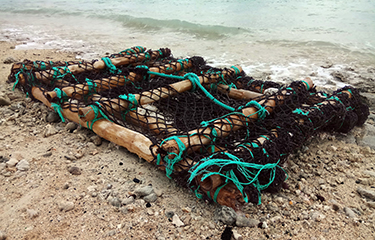IPNLF urges WCPFC to take action on fish-aggregating devices

The International Pole and Line Foundation presented a paper before the annual Western and Central Pacific Fisheries Commission meeting earlier this month, stating that the proliferation of fish aggregating devices (FADS) are negatively impacting tuna stocks and the environment, risking tuna's future availability in the market.
The paper, “The IUU Nature of FADs, Implication for Tuna Management and Markets,” cites the destructive impacts of the use of FADS - from catching a significant number of juvenile tuna; bycatch of protected species such as sharks, rays and others; and marine pollution from FADS that have been lost, beached, or sunk. The paper also claims FADs are contributing to unsustainable tuna fishing and management practices.
FADs may have increased the economic efficiency of the fleet, as in 2018, world catches of the main market species of tuna reached 5.2 million metric tons - an increase credited to the introduction of drifting FADs. But the paper said regional fishery management organizations such as the WCPFC have not done enough to combat the use of FADS in illegal, unreported, and unregulated (IUU) fishing.
“Market forces (in this case, driven primarily by the RFMO IUU Vessel Lists and sustainability programs such as the Marine Stewardship Council’s MSC certification) that have worked in other contexts to align fishing behavior with conservation objectives have failed with respect to FADs; this is due to a misunderstanding of the concept of IUU as it applies to FADs, as well as the way market choices have been framed as ’FAD-caught’ versus ’FAD-free’ tuna,” the paper said.
The paper does not push for a ban on FADs, but rather urges RFMOs to look introduce a transparent system for assigning and tracking FAD ownership.
“Identifying FAD owners and requiring that they mitigate their impacts would ensure the long-term survival of tuna stocks and provide truly sustainable tuna to satisfy market demand,” the paper stated.
RFMOs could benefit from a “FAD registration fee” to be charged to FAD owners, used to fund an effective monitoring, control, and surveillance system and a compulsory observer program (including both human and electronic monitoring) on each tuna vessel, the paper said.
The group also recommended that owners of registered FADs should be mandated to provide RFMOs real-time data on the location of each FAD and access to vessel monitoring system data for every tuna-fishing vessel.
The WCPFC met from 5 to 15 December, and while the RFMO did extend its tropical tuna measures, it did not make any progress on a FAD resolution.
Photo courtesy of RaroLens2/Shutterstock






Share